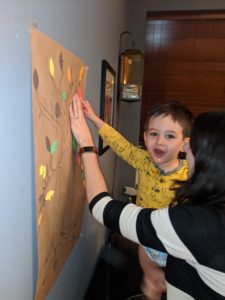How to set boundaries
LISTEN IN APPLE PODCASTS | LISTEN IN SPOTIFY | LISTEN IN STITCHER

Ever heard the story of the little red hen? You know, the children’s book where the little red hen wants to bake some bread, but needs help? She reaches out to all of her neighbors and friends, but they’re all too busy, so the little red hen bakes the bread herself.
Sound familiar? Julie Gerdes Becnel sure thought so! She realized that so many of us were emulating the hen by trying to do everything ourselves that we are overstressed, overworked, and underpaid.
Thus, Little Rouge Hen was born to help busy entrepreneurs and professionals delegate and build out their teams so they can increase capacity and give CEOs and owners room to breathe. Here, Julie shares her tips on how to use the Myers-Briggs personality assessment to help you become a better leader for your team, your employer, or your own business.
How to create space for delegation
If you want a team that generates great ideas, you need fantastic talent. But in order to attract fantastic talent, you need great ideas.
It’s the story of the chicken and the egg all over again! So, how are you supposed to create space for those great ideas to flow when you need help on your team or you’re not able to hire? Luckily, Julie has found a few strategies for that!
Leverage your resources
The first thing you want to do is create space in your life for ideas to flow so that you can work on your vision. It’s extremely important to lean on your support systems, whether that’s your spouse, parents, friends, or in-laws. If you can, hire out for help around the house. Having a cleaning person come once a week or a mother’s helper come twice a week can really free up a ton of space in your day and brain to generate amazing ideas that will attract top-tier talent!
Know yourself well
Julie has a values-based approach to how she approaches everything in life so that she can remain extremely intentional. A few years ago, she read The Happiness Trap with her husband. In the book, there’s an exercise where you work through your values together and decide what values you want to maintain as a family. Each day, they check in with their values and see what actions aligned with their intentions that day.
It’s a great way to look at how you’re spending your time so you can make sure you’re being extremely intentional — rather than letting your day lead you.

Julie and her son adding leaves to the branches of their family’s Value Tree
Live by your calendar buckets
It’s so easy to fill out your calendar and suddenly realize you have absolutely no time for yourself — or room for creativity. So instead of constantly adding things to your calendar without leaving yourself space, Julie suggests coming up with four buckets.
What are the top 4 things you want to be spending your life on, whether that’s your family, kids, self care, creativity? Then, organize your life by these buckets instead of trying to organize those buckets by your life! This is all about being intentional with your time and energy. Remember: work-life balance is a feeling, not a formula.
Using personality assessments to help you hire (and grow as a leader)
Whether you work in a nonprofit, a corporate setting, or you run your own business, the time will likely come when you need to hire help. How are you supposed to decide who you bring on, though?
Julie loves using tools like Clifton Strengths, Myers-Briggs, and the Enneagram to both identify and analyze your own personality type as well as the personality types of the people you hire. Assessments are an absolute game-changer in knowing who you are and the subconscious patterns you might fall into.
Now, first, Julie wants you to know that there are flaws to many personality assessments, and it’s extremely important to remember that they are not the end-all, be-all. In fact, the majority of personality tools are only 80% accurate, but you can improve this accuracy by working with a certified coach like Julie to really see the nuances of your personality and the personality of those around you.
Assessments are an approximation of something that’s real and natural. Instead of thinking about them as a box to place you or your hires in, think of them as a way to understand instead. Looking at someone’s personality type and trying to really understand where they’re coming from and why they do what they do can be helpful in a professional environment.
Why Julie loves the Myers-Briggs Assessment
The Myers-Briggs assessment is an important tool to help you learn to communicate with others, and how they’re communicating with you. Thankfully, no two people are exactly the same and the more we know and understand about others, the easier it is to make magic!
Introverts and extroverts
The first thing to do is use these personality types as an indication of how you should and want to spend your time. For example, being an extroverted person according to Myers-Briggs doesn’t necessarily mean you’re more talkative than other people. Instead, it means that you get your energy from others and therefore, when you need to recharge, other people are going to add to your battery life. Conversely, an introvert loses energy around other people, whether they’re talkative or not, and needs alone time to recharge.
Julie pointed out that your personality type isn’t about labeling you. Instead, it’s about looking at what gives you energy and what takes energy away so that you can make sure you have your focus pointed in the right direction!
If you know that, as a boss, you’re an extrovert but your employees are introverts, that’s a really important thing to take into account when communicating. You might love to drop by their desk and have a conversation about their next project, but they might need to process it quietly before chatting with you. In this case, it’s better to send them an email so that they can process and respond in their own time.
Having proper communication strategies will save you time in the long run!
Sensing and intuition
Everyone sees the world differently. Some people might be big-picture thinkers (sensing on the MBTI), while others move more on instinct (intuition). When you have people of the opposite personality type in meetings and on a team, it can sometimes cause friction. This is one of the biggest reasons so many people have trouble in the workplace.
Now, it’s not about completely changing your worldview or trying to change theirs. Instead, it’s about finding the common ground to help you start on a project together. That might require some individual work upfront before coming together to finish it up.
Thinking and feeling
People who have a preference for thinking make decisions objectively, whereas feeling people tend to put themselves in someone else’s shoes and make decisions from their feelings. Most people who are Thinkers tend to be shorter in their communication style, whereas Feelers would take that communication as rude or abrupt.
Neither one of these is right or wrong, of course. Instead, it’s simply another way that individuals make decisions, and understanding that will allow you to create a team filled with people who have different perspectives. It’s also highly important to train your team in the MBTI and help them understand different communication styles.
Judging and perceiving
Personally, this is the letter in the Myers-Briggs that I rely on the MOST when it comes to my coaching. I know the first instinct we have when we see these words is to associate “judging” with something negative. We’re all taught not to judge, right?
Instead, it’s just another way that people will see and understand the world in order to make decisions. People who have a preference for judging want to get things done so they can check them off their list, but people who prefer perceiving might take longer to do a task because they like to bask in the joy of doing.
This is about getting it done, and HOW. Do you prefer to get extremely specific and break down every task into a manageable chunk? You likely have a preference for judging!
Of course, this all comes with the truth that your personality traits are not a pass. Just because you have a preference for one thing doesn’t mean you get to use it as an excuse for bad behavior or poor performance. Instead, use it as an opportunity to learn new skills and ways of living!
Maybe you’re born with it…
Think of each of these pairs the same way you think of being right-handed or left-handed. You’re born with a preference for one or the other, but you CAN learn how to do the opposite. The same can be said for your personality. These assessments give you the opportunity to be adaptable while also building your teams with extreme intention!
Do you want to learn your Myers-Briggs or Enneagram type in order to help you understand your personality and the personality of those around you? The first thing to do is pay attention to where your energy is going and your understanding of the world. How are you perceiving and dealing with the things that happen in your daily life? What pillars of the MBTI does that perception and understanding most closely align with? Remember, this isn’t a perfect or exact science!
If you want to go even further, you can work with Julie to take your MBTI assessment and understand your personality and how you interact with the world! You can find her here or email her at julie@littlerougehen.com.
In this episode, Julie and I talk about:
- The fable of the chicken and the egg (and how it applies to your work)
- Why you need to know yourself well first
- How to delegate to make space for creativity
- The four pillars of the Myers-Briggs and what they mean for your personality
Stay in Touch with Julie
Resources Mentioned in this Episode
Related Episodes
- Priorities vs. Productivity: How to Choose What’s Most Important
- Simple Magic: How to Be More Intentional with Your Time, Your Friendships and How You Show Up Online featuring Rhiannon Bosse
- It Takes a Village: How to Build a Powerful Personal Support System with Intention
- Work/Life Balance Redefined: Why Your Identity and Your Job Title are NOT One and the Same featuring Adunola Adeshola
Subscribe & Review in Apple Podcasts
If you’re enjoying It’s About Time so far, I hope you’ll take a moment to subscribe if you haven’t yet – I don’t want you to miss an episode! Click here to subscribe on iTunes.
If really like what you hear, I’d be so grateful if you left me a review over on iTunes, too. Your review plays a HUGE role in helping others find out about It’s About Time. And honestly, they’re really fun for me to read! Click here to review, select “Ratings and Reviews” and “Write a Review” and let me know what you’re loving about It’s About Time. Thank you!!
Be the first to comment